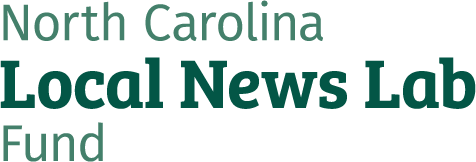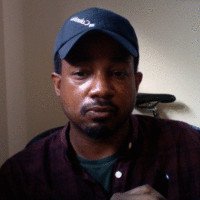This Wilmington, NC project is using stories to link communities and develop solutions
“I love public records, documents, data, ways to connect narratives to empiricism”
Rend Smith, Wilmington Media Ecology Project.
This blog post is part of an ongoing series sharing stories from North Carolina Local News Lab Fund grantees and others working in local news ecosystems. The North Carolina Local News Lab Fund’s goal is to support people and organizations working to build a healthier local news and information ecosystem in North Carolina.
This interview has been edited for length and clarity.
Rend Smith discovered his passion for writing in high school, set against the backdrop of life in inner city Philadelphia. He identified most strongly as a fiction writer, and admittedly wasn’t all that fond of journalism at first.
All that changed when he moved to Dayton, Ohio and started writing for a daily paper there. From that point on, he came to appreciate the way journalism can help people discover the truth — and how it can empower narratives that create equity and justice in communities.
That interest eventually led him to Wilmington, North Carolina and the Working Narratives team, where he serves as the communications director. Now he is leading the charge for its Wilmington Media Ecology Project. The project will train a diverse group of citizen journalists to address news and media deserts in Wilmington, which primarily affect people of color and low-income white communities. You can read more about the project here.
Here’s what Smith had to say about the project, the North Carolina news and information ecosystem and what he’s most excited about going forward.
What drew you to Working Narratives, and later to lead the Wilmington Media Ecology Project?
We believe that we can use stories to link people and help them organize and help them develop solutions. I like this idea of working in the south and on southern narratives. I know from my time spent living and working in the south, there’s vast backdrop of silence here. There’s all sorts of stuff that needs to be reckoned with in terms of southern history and southern power. I was drawn to the idea of working with folks on narrative, which is about the way that we interact with our world and the way that we interact with each other to create a deeper awareness of who we we are, what we face and what we can do together.
Which news or information projects inspire you the most? Who do you look up to?
For me, it’s any project or publication that bears down on the complexity of the American experience, taking on multiple vantage points, perspectives, frames and is innovative about the mediums it uses to produce awareness around all this information. Sometimes that’s like the Marshall Project and ProPublica. More locally, there’s NC Policy Watch. I’m very interested in long-form journalism, so I spend a lot of time on the Longform site. I also keep track of The Intercept.
I love public records, documents, data, ways to connect narratives to empiricism and to what’s true and what’s real. That’s part of this sort of confrontation we find ourselves in. How do you fact-check, narrate and discredit realities? How do we strengthen our relationship with the truth? The reason that’s so important is because language isn’t just the way that we communicate, it’s the way that we agree. I’m really profoundly interested in how journalism is made important by truth.
Are there any unsung heroes in the Wilmington news and information community that you wish people knew about?
The Wilmington Journal, which is the African-American newspaper here, is really doing all it can to cover the black community in a way that’s interesting and respectful.
There’s [also] a guy who does a radio show, Daawud El-Amin. He’s constantly talking about the issues at play in Wilmington and in the south. He’s able to talk about what’s going on the community and really give people his analysis on what’s happening and really being brave about that analysis. I’m not sure that we necessarily agree on all points. But I think voices like his are really important and help to create a public conversation in Wilmington that, in the end, will be enormously beneficial.
What’s your elevator pitch for the Wilmington Media Ecology Project?
For a long time, communities of color and low-income white communities [have been] a target of corporate, government, and media power, and that’s often been exploited. This is an opportunity not just to get people together and to improve on that backdrop of silence, but to create media justice. That’s what we’re trying to get at — that it’s a moral and ethical necessity. People need to be able to speak for themselves, to have a place at the table, to not be told their own stories over and over again, but to be part of a public conversation where they’re fairly represented. I’m hoping that the Wilmington Media Ecology Project is one step in a process where we really begin to remake how people from vulnerable communities interact with their media systems.
Are there any Working Narratives pieces, past or present, that you want to highlight?
I always like to highlight the Free Movement Project conference in March, which focused on southern media and trying to create more equitable journalism here. Free Movement is more than a conference. It’s also a community engagement project. It’s built around modes of interaction — one of them is running and walking together, and using that as a point of connection between people from different backgrounds. It’s also using the actual routes to begin to map our community, like cultural mapping, political mapping, talking about gentrification, talking about gerrymandering, talking about confederate monuments and creating points of connection between people.
Outside the project website, where can people follow along with all the things the project is doing?
Folks can stay up to date by joining the Working Narratives e-mail list found on our website (workingnarratives.org) and following @wnstory on Twitter. They should also look out for the launch of the Media Ecology Project Facebook page.
—
Related Links:
Learn more about the NC Local News Lab Fund’s grant to Working Narratives
Explore other NC Local News Lab Fund Grantees
Read about the NC Local News Lab Fund
Sign up for NC Local, a weekly newsletter connecting North Carolina’s news and information ecosystem
—
About The Author
Rachel Wegner is a journalist and multimedia storyteller currently working as a digital producer at The Tennessean. Wegner wrote and edited a series of Q+As with grantees during her tenure as an intern with Democracy Fund’s Public Square program in Summer 2018. Follow Wegner on Twitter @rachelannwegner.

